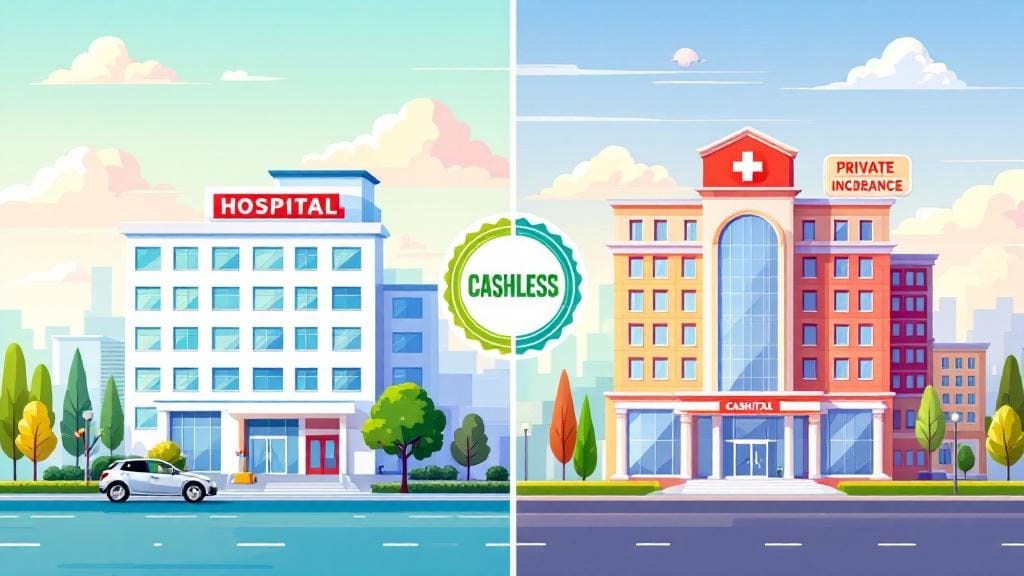When it comes to choosing the right health insurance, you may find yourself caught between two main options: public and private health insurance. Both have their advantages and disadvantages, but the real question is: which one is the best for your personal needs? If you’re searching for cashless health insurance plans, understanding the distinctions between these two types can help you make an informed decision.
In this article, we will compare public and private health insurance in detail, focusing on their features, benefits, costs, and which option could be more suitable for you. We’ll also delve into cashless health insurance—one of the most convenient features offered in modern health plans.
What is Cashless Health Insurance?
Cashless health insurance is a convenient option that allows policyholders to avail medical treatment without having to pay upfront. The insurance provider directly settles the medical bills with the network hospitals, making the whole process smooth and stress-free. This feature is particularly valuable during emergencies when you need immediate treatment but may not have ready access to cash.
Public vs Private Health Insurance: Key Differences
To understand which type of insurance suits you best, let’s break down the key differences between public and private health insurance.
1. Affordability and Premium Rates
Public Health Insurance: Generally, public health insurance is more affordable. In many countries, including India, the government offers subsidized plans, making it an attractive option for low-income families.
Private Health Insurance: Private insurance plans typically come with higher premiums because they offer more extensive coverage, including a wider range of treatments and additional benefits.
2. Coverage and Benefits
Public Health Insurance: The coverage provided by public insurance is usually basic. While it covers essential medical treatments, there may be limitations in terms of the type of care and the number of healthcare providers you can access.
Private Health Insurance: Offers comprehensive coverage with fewer restrictions. Private health insurance policies often cover a wider range of medical services, including advanced treatments, diagnostic tests, and surgeries.
3. Access to Healthcare Providers
Public Health Insurance: Usually has a limited network of hospitals and clinics that are part of the public health system. The choice of doctors or specialists can be restricted.
Private Health Insurance: Offers access to a larger network of hospitals, including private hospitals and specialized medical centers. With cashless hospitalization insurance, you can receive treatment at top-tier facilities without the hassle of upfront payments.
4. Claim Process and Processing Time
Public Health Insurance: The claims process in public health insurance tends to be slower, with long waiting times for approvals or reimbursements.
Private Health Insurance: Generally faster claim processing, and many private insurers offer the convenience of cashless claims. This means you don’t need to handle any paperwork or wait for reimbursements—the insurer settles the bill directly with the hospital.
5. Customer Support and Assistance
Public Health Insurance: Customer service may not always be as responsive, and there may be fewer support options available.
Private Health Insurance: Private insurers tend to offer better customer service with dedicated helplines, online claim submission, and faster responses to inquiries.
Why Cashless Health Insurance Plans Are Gaining Popularity
When you opt for a cashless health insurance policy, you get access to several benefits, particularly during medical emergencies or planned treatments. Here’s why these plans are so appealing:
1. Convenience of Cashless Treatment
With cashless health insurance, you don’t need to pay the hospital at the time of treatment. Instead, the insurance company settles the bill directly with the hospital, as long as the hospital is part of the insurer’s network.
2. Cashless Claim Submission
Most insurers have a simple cashless claim submission process. All you need to do is inform the insurer and get treatment at any cashless hospitalization in network hospitals. You won’t need to worry about paying upfront and later submitting a claim for reimbursement.
3. Wide Network of Hospitals
Top cashless health insurance providers partner with a wide range of network hospitals, ensuring that policyholders can access medical treatment at leading healthcare facilities across the country. This is particularly useful if you need urgent care in a city far from home.
4. No Need for Medical Reimbursement
Unlike traditional insurance, where you pay for your treatment and file a claim for reimbursement later, cashless medical reimbursement is completely eliminated in cashless policies. This means no need for follow-up paperwork, receipts, or waiting for reimbursements.
5. Affordable Coverage Options
Cashless health insurance can be surprisingly affordable. Many plans are designed with flexible premium rates, so you can choose a plan that fits your budget while still ensuring access to cashless medical care benefits when you need it most.
Best Cashless Health Insurance Plans in India
India offers several health insurance plans that come with cashless treatment options. Here’s a quick overview of some of the best cashless health insurance plans in the country:
Star Health and Allied Insurance
Star Health provides a comprehensive range of cashless health cover plans, covering everything from hospitalization to day-care procedures. Their network includes over 9,000 hospitals across India.
HDFC ERGO Health Insurance
HDFC ERGO offers cashless hospitalization insurance at more than 10,000 hospitals in India. Their plans cover both major and minor medical treatments with minimal exclusions.
Religare Health Insurance
With Religare, policyholders can access cashless health insurance services at over 7,500 network hospitals. Their plans also include optional coverage for critical illnesses and maternity.
ICICI Lombard General Insurance
ICICI Lombard is another top provider, offering affordable cashless health insurance with an extensive network of hospitals. Their policies provide cashless treatment for a wide variety of medical conditions.
Cashless Health Insurance: Things to Keep in Mind
While cashless health insurance offers a lot of convenience, there are a few things you should keep in mind before purchasing a plan:
1. Network Hospital Limitations
Ensure that your insurance provider has a wide network of cashless network hospitals in your region. If the insurer has a limited hospital network, it may not be as useful during emergencies.
2. Pre-Authorization Requirement
Some insurance plans may require pre-authorization before availing of cashless treatment. Always check with your provider to understand the claim process and any necessary formalities before hospitalization.
3. Cashless Treatment Claim Process
The cashless treatment claim process can vary from one insurer to another. Be sure to familiarize yourself with the steps involved and ensure that all required documentation is submitted for a smooth experience.
4. Policy Terms and Conditions
Always read the fine print before purchasing a cashless health insurance card. Some exclusions may apply, such as certain types of treatments or pre-existing conditions. Understanding the policy’s terms will help avoid any surprises later.
FAQs
1. What is cashless health insurance?
Cashless health insurance allows you to receive treatment at network hospitals without paying upfront. The insurance company directly settles the medical bills with the hospital.
2. How does cashless health insurance work?
When you require treatment, inform the insurer. If the hospital is in the insurer’s network, you can receive treatment without paying the hospital directly. The insurance company settles the expenses on your behalf.
3. What are the benefits of cashless health insurance in India?
The key benefits include convenience, access to a wide network of hospitals, no need for upfront payment, and a simpler claim process.
4. Which are the top cashless health insurance providers in India?
Some of the top providers include Star Health, HDFC ERGO, Religare, and ICICI Lombard. Each offers a broad network of hospitals and various cashless health insurance plans.
5. Can I avail of cashless hospitalization for pre-existing conditions?
It depends on the insurer and the plan. Some policies cover pre-existing conditions after a waiting period, while others may exclude them. Always read the terms and conditions before purchasing.
6. How do I submit a cashless claim?
Cashless claims are usually submitted directly through the hospital or medical facility. The insurance provider will work with the hospital to process the claim and settle the bills.
7. What is the difference between cashless health insurance and regular health insurance?
In regular health insurance, you pay for treatment upfront and get reimbursed later. In cashless health insurance, the insurer pays the hospital directly, which means no upfront payment is required.







Comments (0)